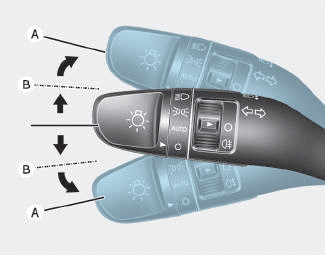Hyundai i-30: Driving your vehicle / Forward collision-avoidance assist (FCA) system - sensor fusion type (front radar + front camera)
Hyundai i30 (PD) 2018-2025 Owner's Manual / Driving your vehicle / Forward collision-avoidance assist (FCA)
system - sensor fusion type
(front radar + front camera)
The Forward Collision-Avoidance Assist (FCA) system is designed to help detect and monitor the vehicle ahead or detect a pedestrian (if equipped) in the roadway through radar signals and camera recognition to warn the driver that a collision is imminent, and if necessary, apply emergency braking.
WARNING
Take the following precautions when using the Forward Collision-Avoidance Assist (FCA) system:
- This system is only a supplemental system and it is not intended to, nor does it replace the need for extreme care and attention of the driver. The sensing range and objects detectable by the sensors are limited. Pay attention to the road conditions at all times.
- NEVER drive too fast in accordance with the road conditions or whilst cornering.
- Always drive cautiously to prevent unexpected and sudden situations from occurring. FCA does not stop the vehicle completely and is not a collision avoidance system.
- System setting and activation
- FCA warning message and system control
- FCA sensor
- System malfunction
- Limitations of the system
 Limitations of the system
Limitations of the system
The driver must be cautious in the
below situations, because the system
may not detect other vehicles or
objects in certain circumstances.
The vehicle drives on a curved
road or through a tollgate...
 System setting and activation
System setting and activation
System setting
• The driver can activate the FCA by
placing the ignition switch to the
ON position and by selecting:
"User Settings → Driver
Assistance → FCA (Forward
Collision-Avoidance Assist)"
The FCA deactivates, when the driver
cancels the system setting...
Other information:
Hyundai i30 (PD) 2018-2025 Service Manual: Condenser
Components and components location Components Location 1. Condenser Repair procedures Inspection 1. Check the condenser fins for clogging and damage. If clogged, clean them with water, and blow them with compressed air...
Hyundai i30 (PD) 2018-2025 Owner's Manual: Master Warning Light. Low Tyre Pressure Warning Light. Fuel Filter Warning Light (for diesel engine)
Master Warning Light This indicator light illuminates: • When there is a malfunction in the below systems. - Low washer fluid (if equipped) - Exterior lamp malfunction (if equipped) - HBA (High Beam Assist) malfunction (if equipped) - BCW (Blind-Spot Collision Warning) malfunction (if equipped) - FCA (Forward Collision- Avoidance Assist) malfunction (if equipped) - ISLW (Intelligent Speed Limit Warning) malfunction (if equipped) - SCC (Smart Cruise Control) malfunction (if equipped) - Tyre Pressure Monitoring System (TPMS) To identify the details of the warning, look at the LCD display...
Categories
- Manuals Home
- 3rd Generation i30 Owners Manual
- 3rd Generation i30 Service Manual
- Scheduled maintenance services
- Headlamp, static bending lamp, position lamp, turn signal lamp and daytime running light bulb replacement
- EPB malfunction indicator
- New on site
- Most important about car
Turn signals and lane change signals

To signal a turn, push down on the lever for a left turn or up for a right turn in position (A). To signal a lane change, move the turn signal lever slightly and hold it in position (B).The lever will return to the OFF position when released or when the turn is completed.
Copyright © 2025 www.hi30.net
